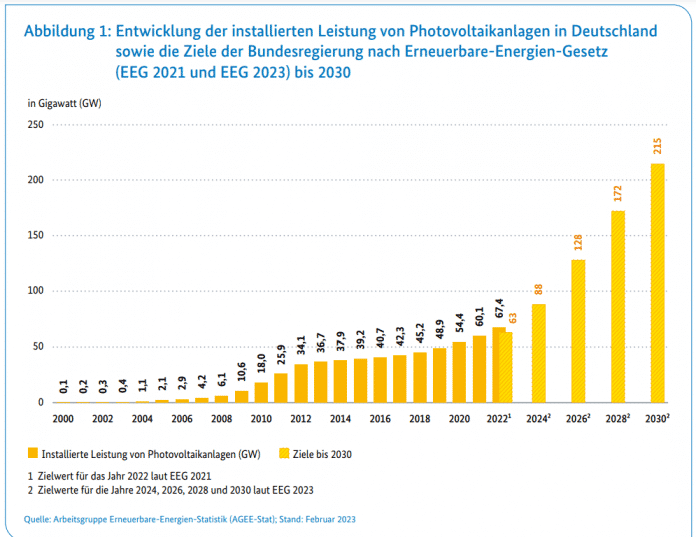The Federal Ministry of Economics presented an updated photovoltaic strategy last Friday. The ministry had already made an initial contribution to this in March 2023.
The solar energy expansion in Germany is to be simplified and accelerated with the PV strategy. Both concrete simplifications for the construction and connection of solar systems are promised, as well as the promotion of training and research.
According to the Federal Ministry of Economics (BMWK), the implementation of the strategy should have started immediately with its publication and should initially result in a legislative package with the working title “Solar Package I”, which is to be presented before the summer break. A second package is already in prospect.
The German Solar industry welcomed the strategy. Germany’s solar technology expansion goals are ambitious, but there is no alternative, explained Carsten Körnig, General Manager of the German Solar Industry Association. The share of solar energy in the German energy mix can only increase as planned with comprehensive energy policy reforms and a consistent removal of investment barriers.
Expansion of solar energy
By 2030, the share of renewable energies in gross electricity consumption should be 80 percent, explained Federal Minister of Economics Robert Habeck (Greens) to present the strategy. With an installed capacity of 215 gigawatts by 2030, solar energy should make an important contribution to this. According to Habeck, the expansion is already visibly picking up. Last year it was more than 7 gigawatts, for the current year there is an interim target of 9 gigawatts. Almost 2.7 gigawatts (GW) were added in the first quarter of 2023.

The BMWK intends to consolidate the boost in solar energy with new legislative packages and thus achieve the expansion targets by 2030.
(Bild: BMWK)
The BWMK has eleven individual measures for the Strategy named. This includes, for example, the increased construction of open space systems, which should also be set up as Agri-PV, for example to prevent competition for land; there should also be a definition of biodiversity PV. In the field of ground-mounted systems, an annual expansion of 11 GW is planned from 2026.
In the area of roof systems, the BMWK wants to implement further simplifications for construction and marketing. The paper states that, for example, “the obligation to direct marketing must be made more flexible and the legal requirements for the technology that small systems must provide for direct marketing must be reduced”. In addition, it should be checked whether the regulations on system combination lead to inappropriate results in certain constellations.
In addition, existing buildings in the outdoor area are to be increasingly approved for the payment of PV roof systems. An annual expansion of 11 GW from 2026 is also planned for roof systems. Grid connections are also to be accelerated for roof and ground-mounted systems. For larger roof systems, for example, the certification process will be simplified.
Tenant electricity and balcony solar
There should also be simplifications for tenants and owner associations. The PV strategy envisages a “communal building supply” for which, for example, the already established tenant electricity model is to be further optimized. The BMWK would like to discuss possible further steps with the stakeholders in the second half of the year.
The BMWK also wants to implement simplifications for balcony solar systems. The obligation to report should be simplified or deleted, the power threshold of 600 watts raised, the Schuko plug approved as an “energy plug device”, backwards rotating meters also temporarily tolerated and privileges in home ownership and tenancy law set – this should happen in “Solar Package I”.
In order to increase the public’s acceptance of solar energy, the funding program for onshore wind energy launched in January 2023 by citizens’ energy companies is to be extended to include PV systems. In the area of energy and tax law, the BMWK wants to work within the coalition for simplifications.
Restart European production
The domestic production of PV modules, inverters and other components is to be rebuilt using support programs. For this purpose, a feasibility study by the Association of German Mechanical and Plant Engineering (VDMA) has been prepared since March 2023. An increase is planned for research funding.
Skilled workers for the accelerated expansion are to be won through an increase in training opportunities and further training, but also through the immigration of skilled workers. At EU level, the accelerated expansion is also to be supported by initiatives as part of the “Fit for 55” package.
(by)
